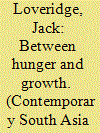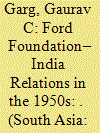| Srl | Item |
| 1 |
ID:
152350


|
|
|
|
|
| Summary/Abstract |
Built from the ground up by three thousand Sikh and Hindu refugees in the aftermath of the Partition of India in 1947, the town of Nilokheri in East Punjab emerged as an unlikely centre of agricultural education and scientific exchange. With support from the Ford Foundation, Indian and American scientists and development planners worked through the 1950s to transform the refugee township into a model of agricultural innovation and community development. Prime Minister Jawaharlal Nehru even cast Nilokheri as the first step on the ‘road to new India’ that would bring the nation to self-sufficiency in food production. Over the course of a decade, experimental farms, workshops, and agricultural training centres rose around the village. The bustling town rapidly became an internationally recognised centre for deploying new farming technologies, training farmers, and sharing scientific knowledge. Yet for all its initial promise, allegations of bureaucratic mismanagement dogged the project, floodwaters disrupted the site in 1957, and Ford’s interest shifted by the early 1960s. The Nilokheri experiment, however, set the stage for the scientific and social interventions of India’s Green Revolution, contributing to an international development paradigm that persists today.
|
|
|
|
|
|
|
|
|
|
|
|
|
|
|
|
| 2 |
ID:
177191


|
|
|
|
|
| Summary/Abstract |
This paper investigates the development of a close relationship between the Ford Foundation—the world’s richest and most internationally oriented philanthropic organisation in the Cold War era—and India in the 1950s. Unlike existing literature on private foundation–recipient country relationships, which overwhelmingly focusses on the donor perspective, this essay explores the recipient perspective, thereby contributing to the emerging literature on Third World agency in international politics. Complicating the idea that recipient countries were overwhelmingly interested in aid maximisation, this article shows that India moved closer to the Ford Foundation in order to fulfil diplomatic rather than aid-related objectives.
|
|
|
|
|
|
|
|
|
|
|
|
|
|
|
|
| 3 |
ID:
091178


|
|
|
|
|
| Publication |
2009.
|
| Summary/Abstract |
Here author recalls the part played by the Ford Foundation in setting up the NZIIA's National Office
|
|
|
|
|
|
|
|
|
|
|
|
|
|
|
|
| 4 |
ID:
028958


|
|
|
|
|
| Publication |
Albany, State University of New York press, 1983.
|
| Description |
viii,227p.
|
| Standard Number |
0-87395-725-3
|
|
|
|
|
|
|
|
|
|
|
|
Copies: C:1/I:0,R:0,Q:0
Circulation
| Accession# | Call# | Current Location | Status | Policy | Location |
| 026720 | 327.73/BER 026720 | Main | Withdrawn | General | |
|
|
|
|
| 5 |
ID:
087745


|
|
|
|
|
| Publication |
2009.
|
| Summary/Abstract |
From 1954 to 1964, the Ford Foundation attempted to implement an ambitious program of rural development in Iran. Through education, grassroots initiatives, and better credit, the Foundation hoped to transform Iran's peasant population into a base around which Iran would become a democracy. Its efforts, however, ultimately proved unsuccessful. This article argues that Ford's initiatives failed in part because its vision for the region was at odds with the goals of American foreign policy, which sought stability instead of democracy.
|
|
|
|
|
|
|
|
|
|
|
|
|
|
|
|